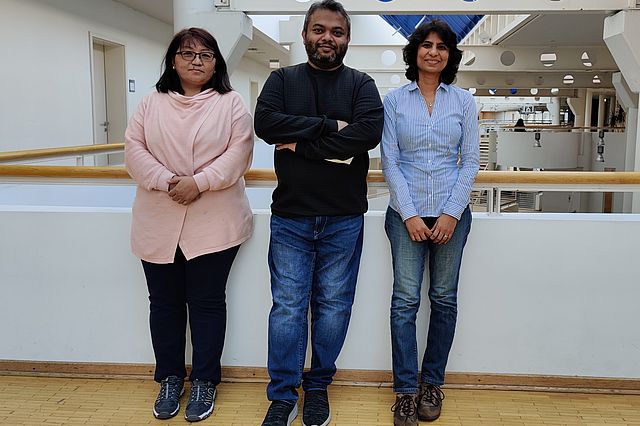Visiting Researchers from Bhutan and Bangladesh at UW/H to develop an international Master in Public Health
Visiting Researchers from Bhutan and Bangladesh at UW/H to develop an international Master in Public Health
With the help of the DAAD STIBET scholarship, Deki Pem, a medical professional with a Master in Nursing Science in Child, Family and Community from Bhutan, and Dr. Mehedi Hasan, a medical doctor with a Master of Public Health from Bangladesh, are spending three months at UW/H. Together with the team of the Friede Springer endowed professorship for Global Child Health they worked on a funding proposal to set up a joint master's program on Public Health. This should lead to a long-term partnership between the universities and create a wider and international offer for all students.
Could you introduce yourself shortly using these three questions: Who are you? What is your scientific/ professional background? Why is global child health important to you?
Deki: Thank you for giving us the opportunity to speak on who am I, why I am here, and what I am doing in UW/H. My name is Deki Pem, back home I work as an academic and also look after academic-related matters. By profession, I am a nurse and I have a background in mother and child health. I do research on child health-related. There are a few reasons for me being here such as the subject of my interest and one of the medical students from this university is coming to Bhutan to do a study on child development screening tools.
Mehedi: Thank you so much for having me here and for the Interview. My name is Mehedi Hasan, and I am a medical doctor by training. I graduated from Dhaka Medical College in 2012; afterward, I practiced for two years in a clinic, treating patients. Most of the diseases I consulted were preventable, which motivated me to do a Master of Public Health from BRAC James P Grant School of Public Health, BRAC University (BRAC JPGSPH). I graduated from BRAC JPGSPH in 2016, and since then, I have been working there. Currently, I am working as a “Senior Lecturer” and coordinating one of the five centers known as the Centre for Non-communicable Diseases and Nutrition (CNCDN). Now I am more involved in teaching, but apart from teaching, I am also implementing several research projects in my current institution.
Together with members of the Friede Springer Endowed Professorship for Global Child Health at the University of Witten/Herdecke (UW/H) you are working on the project "Developing faculty at Khesar Gyalpo University of Medical Sciences of Bhutan (KGUMSB) and James P. Grant School of Public Health (JPGSPH) of Bangladesh through partnership for learning and teaching in health" – is that correct?
Mehedi: That was the initial idea. The name you have mentioned was fixed during the initial discussion, but the name has been changed a bit. However, we are still focusing on the capacity building of faculty members from the University of Witten/Herdecke, KGUMSB of Bhutan, and BRAC JPGSPH of Bangladesh through cooperation partnership.
Deki: We are developing the proposal on project title “Cooperation partnership to promoting interconnected higher education system to bring transformative change in future Public Health professionals”. We can strengthen the capacity of faculty in academics through the partnership with UW/H and JPGSPH particularly on global health and public health and can think of a master programme in our country.
Mehedi: Our goal is to develop an international Public Health Master's program offer at the University Witten/ Herdecke with collaboration with Bhutan and Bangladesh. Since we are already offering the international Master of Public Health program in Bangladesh, we will support in this process from our experience.
What is the time horizon for the project?
Mehedi: We are currently working on the project. We came here in October and started to develop the project. We also had a meeting with Prof. Jan Ehlers [Vice President for Teaching and Learning]* and Prof. Patrick Brzoska [Chair of Health Services Research]* to discuss our ideas and get their luminous feedback. They gave us some feedback, and we are currently working on it to come up with a concrete plan. We are here for three months, and before leaving, we will develop the draft proposal. The deadline for the proposal submission is March 2022, so if we can successfully crack the fund, we may start the project at the end of 2022.
Deki: Initially we will first start with the advanced courses in collaboration with these universities and then gradually develop a full Master programme in Public Health.
Mehedi: Master of Public Health is generally an applied degree that covers the basic courses related to public health. For example, introduction to public health, basic epidemiology, basic statistics, Quantitative methodology, etc. However, there can be specialized courses or advanced courses on global child health, maybe on implementation research or Gross National Happiness or Nutrition.
Deki: We are thinking of a unique course that Bhutan and Bangladesh can offer for the Public Health students. If the students would like to learn different, unique of my country then this offer surely makes a long-term partnership attractive and to give the different country’s perspective to the Public Health students.
Mehedi: Also, we have to be unique and innovative in some ways. There are other institutions even in Germany offering the Master of Public Health. Then, why are we planning to offer another Master of Public Health course? One unique approach of our programme is that we are planning to create a basket with best practices from the partner institutions. Later, we will combine those best practices and make something better and very solid for the students so that they get benefits in the long run.
Within the project, you see all the differences especially in the health systems and the academic differences on how things are taught and things are handled. What are the two main differences you observed between Witten and your home country? (Both in the scientific/work context and in everyday life).
Deki: In terms of academics, I have not attended any teaching sessions/classes, so I cannot say anything about that. But at work, I am always considered as one of Global Child Health's working colleagues with good guidance on proposal development. I must say, we have a good working team, which is important and essential to accomplish the overall objective of three months of work here in UW/H.
Mehedi: In Bangladesh, we primarily focus on experiential learning in our Master of Public health Programme. What does that mean? Students often learn theories in the classroom, but they don't get the opportunity to practice those theories in the field. Therefore, we have designed our programme in a way that students are not only learning the theories but also going to the field at the end of each course to apply whatever they learned in the classroom.
The one thing I like here in Germany is the way people talk and help each other. I can give you one particular example: I came here on 2nd October. After completing my first day at the office, I stood at the bus stop to return to my apartment without knowing it was the wrong bus stop. The bus I was waiting for did not go in that route. It was almost 5 pm, and there was no one except me. Then I saw a person who was roaming with his dog. He saw me standing at the wrong bus stop. That person immediately understood that I was not from here, maybe by looking at my face. He immediately approached me and said something; perhaps he said, "You're in the wrong place", but he said it in German, and I did not know what he said. Nevertheless, he tried to explain it in every possible way; still, I could not get his sentences. Then he just grabbed my hand and said, "come, come". He grabbed my hand and walked for 40-50 seconds to put me in the right place. Otherwise, I would have had a lot of difficulties reaching my apartment because nobody was there. That was an amazing experience because he gave his best effort to help me get to my bus stop. I loved the way he helped me.
Two things are very different from Bangladesh: first, the weather is unpredictable. In Bangladesh, we are used to seeing heavy rain, but it drizzles here most of the time. Another thing is the gathering of people outside the home. They are spending time together, roaming at the market, taking tea, etc. But here in the evening, I see no one on the road. They spent more time at home rather than outside.
Deki: People greet us even though they do not know us. If we have to communicate more than just greetings, then we either communicate with a gesture or use a translation app, but I have noticed that the majority do understand English.
Cold weather with drizzling almost every day is something that I have experienced here. We expect snowfall with such weather but here it is just a light shower. There are many options for public transport such as train or tram in addition to bus and taxi. We do not have trains and trams because we live either in the valley or on the mountain. Moreover, we do not have traffic lights, drivers have to have an understanding of taking turns on multiple bifurcations, U-turns, or roundabout, or to change the lane. We use gestures for communication.
Mehedi: There is another thing why this works: they are highly disciplined on the road.
Deki: True, we never honk unless in emergency and I have not heard in German either. Right-hand driving is confusing me. I don’t think I can ever drive here.
Mehedi: There are a lot of things to learn from each other. Therefore, this kind of exchange program is super helpful. It is very costly to visit another country to learn those things altogether. This kind of collaborative work can give you the opportunity to do your job and learn cross-cultural things. I had never visited Germany before, so I thought it would be difficult to adjust here. The way our colleagues from the child health department and you guys from the international office helped us was amazing. I am looking forward to sharing this experience once I return to Bangladesh!
Thank you, Deki and Mehedi, and all the best for the future!
If you are interested in finding out more about the STIBET program and opportunities for international research partnerships, please contact us: international-office@uni-wh.de
*Author’s note
Article was written by Sarah Alschner, Student Assistant, International Office.
Overview
Die Universität Witten/Herdecke ist durch das NRW-Wissenschaftsministerium staatlich anerkannt und wird – sowohl als Institution wie auch für ihre einzelnen Studiengänge – regelmäßig akkreditiert durch:







